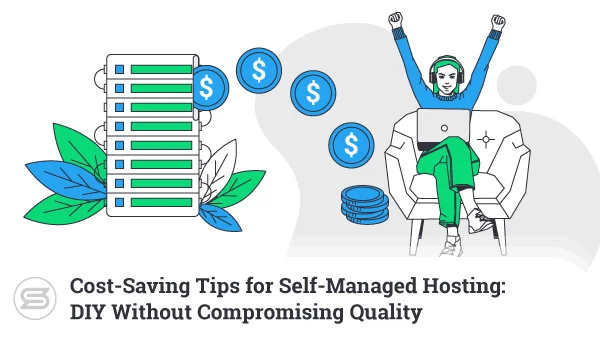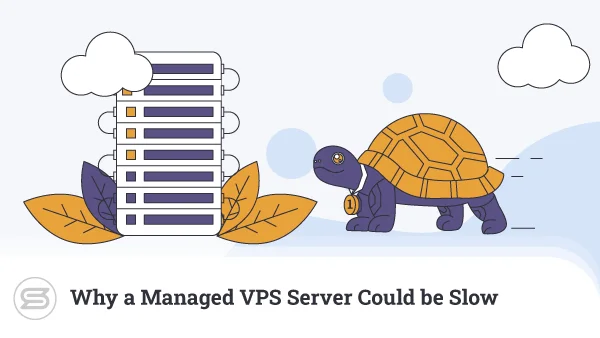VPS (Virtual Private Server) hosting is in high demand right now, and there’s little wonder why. VPS plans beat other services hands-down in almost every aspect, including reliability, speed, security, and, most notably, scalability. When it comes to managed VPS plans, we can add ease of use to that list.
One aspect of virtual servers that is sometimes overlooked, however, is their versatility.
You can use a VPS for almost anything you can imagine. From setting up a hosting reseller business to playing Minecraft, from sending emails to Forex trading – your virtual server has a solution to everything.
But what about software creation?
Development teams have strict requirements for the platforms on which they write, test, and run their code. Many software vendors follow a model called DevOps while building their applications, which involves a set of tools and procedures that can’t be deployed in just any old environment.
You’re probably wondering whether a managed VPS hosting package suits this model.
We’re about to find out.
Introduction to Managed VPS Hosting
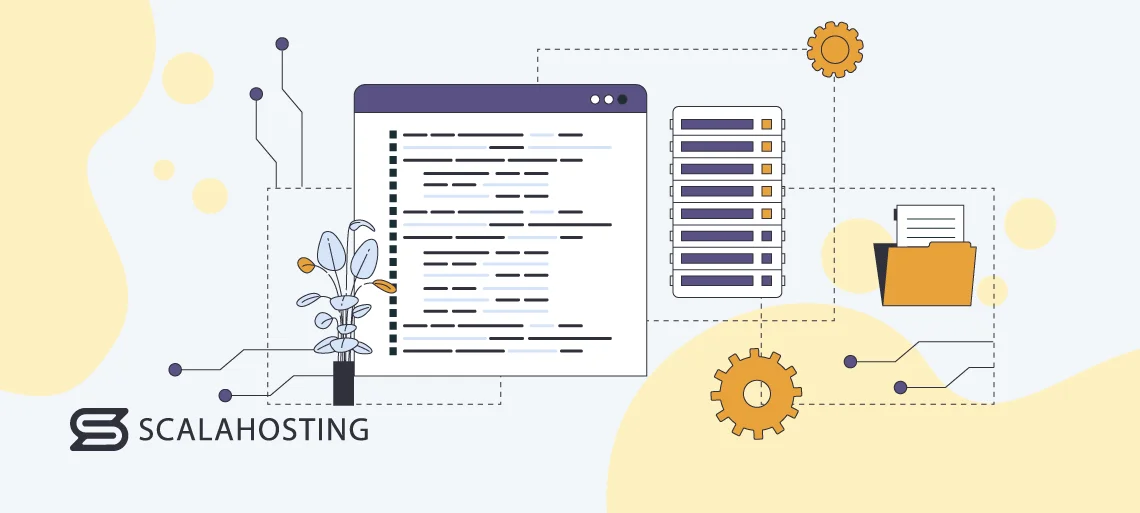
In the past, people in need of a hosting service had to choose between either shared hosting or a dedicated server. The former was reserved for small-size projects, and the latter was suitable for businesses, online stores, and high-traffic websites.
Dedicated servers were the most advanced form of hosting, but they were rather expensive and had a few distinct shortcomings. VPS hosting was developed to give you all the benefits of a dedicated machine with none of the drawbacks.
Thanks to cloud and virtualization technologies, web hosts can now give you a virtual machine (VM) that acts just like a dedicated physical server.
It works completely independently from the rest of the accounts deployed by the same host and is fully isolated from every other project and client. It has a hardware configuration determining how much processing power, memory, and storage space you’re allocated, and these resources are available to your VM 24/7. This makes for reliable performance and predictable speeds – something that used to be achievable only by a dedicated server.
At the same time, allocating server resources to multiple virtual machines allows hosting providers to utilize their hardware much more efficiently, meaning VPS plans are cheaper than dedicated ones. They’re a lot more flexible, as well.
Your VM works on top of a virtualization layer, which means hosts can deploy, suspend, reconfigure, and redeploy it at will. This is a massive advantage when your project exceeds the capacity of your current hardware configuration and needs more resources.
Instead of moving to a more powerful machine like you would if you were on a dedicated server, your provider can simply update your VM’s hardware configuration and give you the required power. So, a VPS can provide a reliable, easily scalable environment at a competitive price.
However, it will only do it if it’s configured correctly. This is why a managed VPS service is often much more appealing than a self-managed one.
With a managed virtual server, your VPS is ready for you from the get-go. Your host’s technical team deploys it, installs the software stack included in your package, and lets you get on with your work.
Things like updates, security configuration, and monitoring are all handled by professionals, and you have a control panel to manage the projects hosted on the server. But what sort of projects are we talking about today?
What Is DevOps?
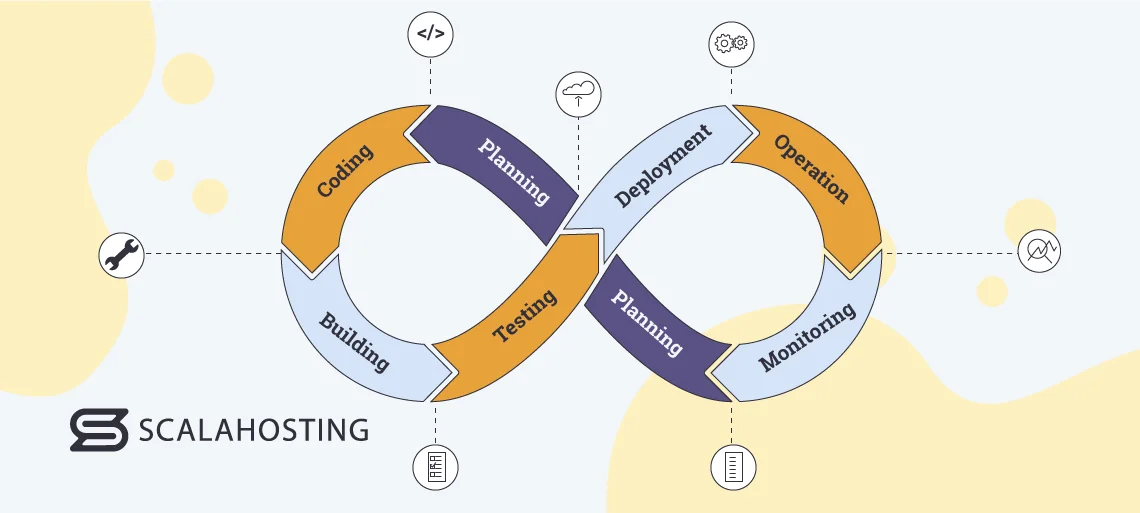
To understand what DevOps means, we need to look into a software development philosophy called Agile. It was defined in the early 2000s and significantly changed how many people approached software development. According to Agile, the implementation of certain collaborative practices combined with automation and incremental software development procedures can streamline the process of building applications.
The DevOps model steps on some of the core Agile principles. More specifically, it uses collaboration and automation to improve the speed with which software is built and released. However, while Agile is focused only on software development, DevOps encompasses the entire rollout process.
A large-scale software project deployed under a traditional development is usually run by two primary teams – a development team and an operations team. The developers are responsible for writing the code and implementing the features requested by the customer. When ready, they hand it over to the operations specialists who need to put the app in a production environment, ensure it has everything it needs to work correctly, and prepare it for use by the general public.
They also manage applications hosted on the production server and ensure the machine works fine. Traditionally, the two teams are isolated – with neither developers nor operations specialists knowing what the others are doing.
By this stage, you have probably guessed that under the DevOps model, things are different. DevOps is a portmanteau of the words “development” and “operations,” and it employs one set of principles to speed up and streamline two seemingly very different stages of the app-building process.
Every single line of code built in a DevOps environment goes through seven different stages, namely:
- Planning – The benefits of the new feature are identified, and the requirements for its implementation are met.
- Coding – During this phase, the code is actually written.
- Building – With the help of automated tools, the code is compiled and packaged for deployment in production.
- Testing – The phase involves manual or automated testing to ensure the code is clean.
- Deployment – The application is finally rolled out to production during this stage.
- Operation – This is the management of the actual application in a production environment.
- Monitoring – The app works in the production environment, and information about its performance is gathered, fed back, and processed by developers and operations experts.
Automation tools streamline the completion of various tasks, and strict procedures are in place to ensure high-quality work.
The correct implementation of a DevOps model results in a few key benefits:
Faster delivery
A DevOps environment encourages collaboration throughout the software’s entire lifecycle. This means setbacks that arise at any stage during the development and deployment process are dealt with more quickly.
In addition to this, integrated testing, quick feedback, and continuous communication between the development and operations teams means faster rollout for the planned features and functionality.
Higher-quality product
Operations specialists and developers are in constant communication, so if there are any issues with how the app works, they can be reported straight back to the programmers. The bugs are often easy to identify and fix thanks to versioning control systems and other automation tools.
More efficient utilization of people and resources
A company working under the DevOps model tries to automate as many tasks as possible. On the one hand, this minimizes the risk of human error; on the other, it leaves team members more time to focus on developing and deploying software.
The efficient workforce utilization also enables the team to be more agile when clients request new, unplanned features.
A more stable work environment
By making your teams collaborate, you automatically remove much of the tension that may otherwise arise between them if you use the traditional approach. The constant feedback and communication with other team members and the frequent releases of high-quality software can further motivate both developers and ops specialists.
The continuous collaboration of experts from different fields introduces staff members to new challenges and enables them to broaden their expertise – another motivation boost.
Lower cost
Pretty much all DevOps principles can lower your app’s production costs. The incremental software development enables the continuous delivery of new features while the app is in production, meaning you don’t need to waste money waiting for the finished product to be rolled out.
Automation enables you to do more things with fewer people and keeps staff members focused and productive. And thanks to collaboration, high-quality products are delivered more quickly and cheaply.
DevOps Tools
Switching from a traditional model to DevOps means completely overhauling the company’s entire workflow. This would be impossible without the right tools.
There are hundreds of utilities and applications that can successfully be implemented in a DevOps environment. So, how many do you actually need, and what are they?
This is (in the case of larger software vendors, quite literally) the million-dollar question.
Every stage of the app development process – from planning to monitoring – must be considered. You’ll have to assess your project’s requirements, look into the tools that can help streamline and automate as many of the tasks as possible and shortlist the ones that can be of real help. And don’t forget to ensure they can be easily integrated into your hosting and IT infrastructure.
Ultimately, the arsenal of DevOps tools you’ll pick depends on many different factors, including the size of your team, the complexity of the project, the programming languages, the budget, etc. No two apps are the same, so there’s no list of recommended utilities and platforms that guarantee to boost your DevOps workflow. However, some applications and technologies seem to be a good solution in almost every scenario.
Here are a few examples.
Docker
Docker is a containerization platform that uses OS-level virtualization to create isolated environments for building and running your applications. Docker containers are extremely memory efficient and convenient.
When deploying a new container, you can start an empty one and build from there or choose from one of hundreds of images. An image deploys the container with a predetermined range of software applications and libraries already installed on it. This allows ops specialists to deploy a fully functioning production or stage environment with a single command.
Docker containers let you host multiple applications on the same server and make the development software portable – you can take a container from one machine and deploy it on another quickly and easily.
Git
Originally authored by Linus Torvalds (the creator of Linux), Git is the world’s most popular distributed versioning control system. It works on a client-server model – a central server holds the main code repository, with programmers using clients to access it.
With the help of commands, developers can clone repositories, add code, push changes, create snapshots, etc.. Because multiple people can access the same repository simultaneously, Git is integral in guaranteeing easy collaboration – one of the pillars of the DevOps model. It’s also essential for many companies’ constant integration/constant deployment (CI/CD) pipelines.
Jenkins
Jenkins is an open-source automation server responsible for removing the human factor from numerous tasks related to CI/CD, building, testing, and deploying software.
Automation is central to any reliable DevOps infrastructure, so it’s no surprise that Jenkins often plays a significant role in the everyday work of many software vendors. Part of its popularity stems from the fact that it’s compatible and easily integrated with numerous other widely used DevOps tools, meaning creating a reliable environment around it is pretty straightforward.
Maven
Maven is a build automation tool designed to provide a uniform framework for better efficiency and consistency. It simplifies many tasks related to project management, code compilation, testing, and even documentation, proving an invaluable code standardization and maintenance tool. Maven supports a range of programming languages, including C#, Scala, Java, Ruby, etc., and configures projects according to the Project Object Model (POM).
In essence, this means that there is an XML file describing the entire project’s build process and structure. It also contains information on the required external modules Maven automatically downloads and runs to build the app.
Many other tools and platforms can also be implemented, sometimes in areas that may not seem particularly essential at first glance. For example, it’s easy to ignore the importance of an instant messaging platform giving everyone quick access to other team members. Slack and Microsoft Teams are good examples.
Task assignment and management can also be critical, so platforms like Jira could be central to the operations of the entire company. Be sure you ask all the questions and find all the answers before you start working on your project.
ScalaHosting Solutions for DevOps Environments
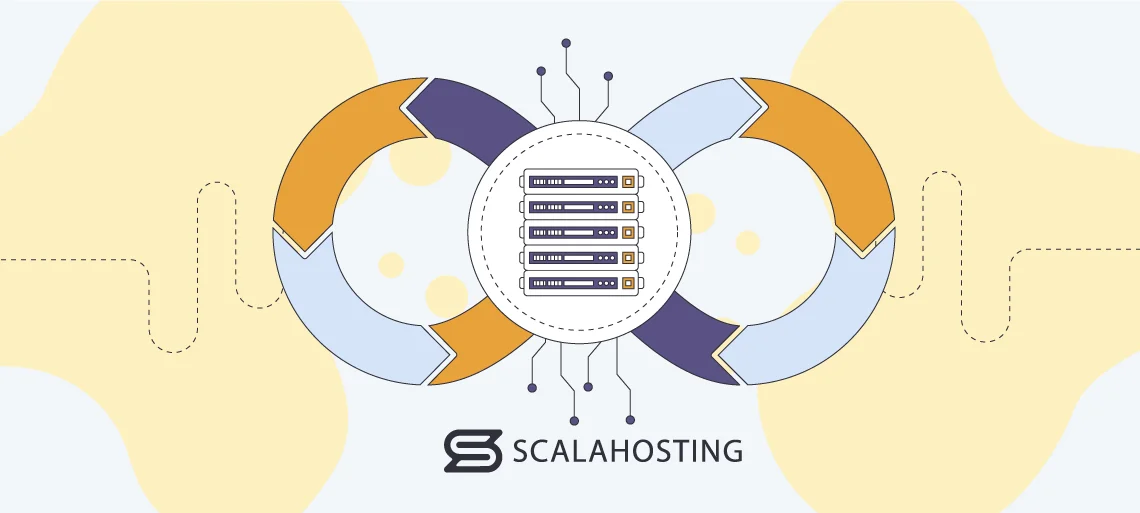
Managed VPS services have been central to ScalaHosting’s business for over a decade. We’ve been focusing on virtual servers because their key advantages over other types of hosting make them the best solution for projects of all shapes and sizes.
Although it’s traditionally considered a web hosting solution, a virtual private server can be used for a lot more than just websites. And we’ve made sure our VPS plans are suitable for as many projects as possible.
If you’re building an app following the DevOps model, our managed VPS services can provide a reliable environment based on a proper cloud infrastructure and state-of-the-art hardware. We use proven virtualization technology to ensure your VM is fully isolated and have taken a range of precautions to ensure your data is safe with us.
Your managed virtual server has a pre-configured firewall and automatic backups stored in an offsite location per established security best practices. It’s also equipped with a control panel for managing the projects hosted on the VPS.
More specifically, we recommend using SPanel – a server management solution developed by ScalaHosting and built precisely for VPS services. In it, you’ll find quite a few useful tools for developing your app.
For example, you can switch between three different web server solutions without writing a single command. You can also choose the database engine and create/manage databases and users through a point-and-click interface.
Git is installed by default, and commonly used app development technologies like NodeJS are supported and integrated into SPanel.
We have more yet more features in the pipeline. For example, SPanel users will soon be able to create and manage Docker containers through their control panel. Docker is supported but can only be managed through the command line.
You might not be used to creating a DevOps environment on a managed server. It stems from the fact that most managed solutions don’t offer root access.
That’s because your host’s technicians configure the VPS core settings for the best possible performance and security out of the box. To stop inexperienced users from undoing all that hard work, hosts often restrict the ability of server owners to execute sudo commands.
At ScalaHosting, we realize that this may stop you from creating the environment you’re after. We believe you can have the convenience of a managed service and still be able to set up everything you need to build and run your project. That’s why if you have a ScalaHosting managed VPS, you can request root access from our technical support team.
You’ll have the privileges you need to build your DevOps environment without worrying about things like core server configuration or security patches.
Make sure you get in touch with us if you want to learn more.

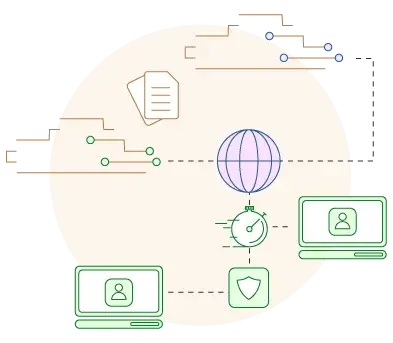
Conclusion
When the concept of DevOps first appeared, it revolutionized the way many software vendors and development agencies work. Right now, thousands of software vendors across the globe use the model to streamline their workflow and improve the quality of their products.
However, before you can take full advantage of it, you have to deploy a proper DevOps environment that supports all the tools and provides all the power you need to build your application quickly and efficiently and automate as much of its development as possible.
Is a managed VPS a good place to start? It certainly looks like it. However, you need to know how a typical DevOps environment works to get the right solution from the right provider.
FAQ
Q: Do I really need VPS hosting?
A: If you want to build a successful application under the DevOps model, you’ll need the isolated environment of a separate server. You can hire an entire dedicated machine just for the purposes of your project, but in addition to being pricey, these solutions are neither flexible nor particularly reliable. A VPS is more cost-effective and can provide the same power, performance, and security with the added benefit of being much easier to scale.
Q: What types of VPS are there?
A: There are managed and self-managed (or unmanaged) VPS services. The difference is in the way your host deploys and takes care of your server. With a managed solution, your provider’s technicians set up the server and the software on it so you can start work on your project immediately.
With a self-managed server, it’s up to you to configure the core server settings and the software running on your VPS. It’s a more customizable solution but requires more time and technical skills to set up and maintain.
Q: Is managed VPS hosting worth it?
A: Because a managed VPS server requires more work from your host, it tends to cost more than the equivalent self-managed solution. It may put additional weight on the budget, but in the long run, it will save you a lot of time and effort maintaining the server in perfect working order, so in many cases, the extra layout is well worth it.

